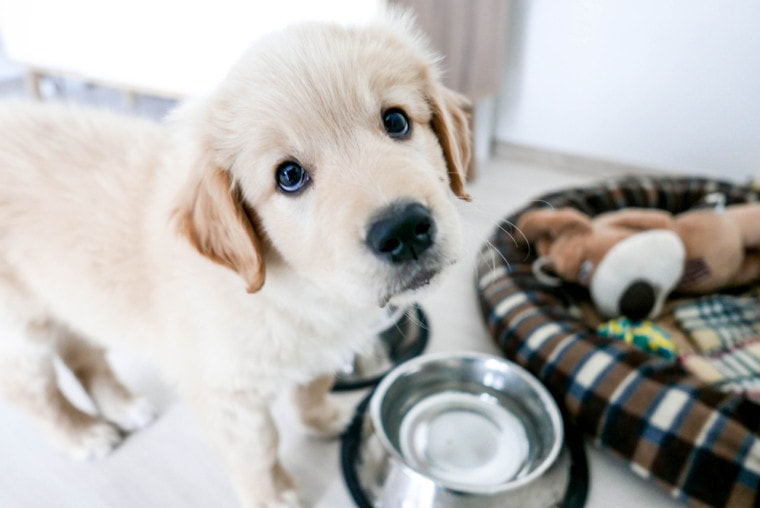
There are several reasons your puppy may turn their nose up at food. It is imperative to try to determine the cause of anorexia as soon as possible and quickly get them eating again. Young puppies, especially small breed puppies, are at risk of developing hypoglycemia when anorexia is prolonged. Below are a few reasons as to why your puppy may not be eating.
The 4 Possible Reasons Why Your Puppy Isn’t Eating
1. Stress
Puppies can experience stress when their familiar environments and conditions change. This may be experienced when a puppy is first separated from their mom and siblings, or when they enter a new household. Puppies can show signs of stress through not eating, being vocal, hiding, or being very clingy.
When introducing a new puppy into your household, try to establish routines so that the puppy can know what to anticipate. Take the puppy out the same door to eliminate, feed in the same location, feed at the same time, and preferably offer the same food the puppy has been receiving prior to coming into your care. If the diet your puppy was previously on is not high quality, slowly work on transitioning them to the preferred diet after the initial shock of a new environment has settled.

2. Illness
Unfortunately, illness can be a cause of a reduced or absent appetite. Young puppies can experience illness secondary to bacterial, parasitic, or viral infections. Your puppy may first show signs of inappetence but may also experience lethargy, vomiting, diarrhea, and weight loss. Young puppies have an immature immune system and can have a harder time clearing infections than adult dogs. Puppies are especially at risk for contracting parvo, a viral infection that causes gastrointestinal signs and most often occurs in young, unvaccinated puppies.
Alternatively, some puppies are born with congenital abnormalities, an example of this could be a dog born with a liver shunt. Your puppy may be facing an illness associated with growth, or even an immune-mediated disorder that may present with a reduced appetite. Hypertrophic Osteodystrophy (HOD) and panosteitis often cause a reduction in appetite secondary to pain associated with changes to long bones. Admittedly, puppies suffering from an illness will often present with more than just a reduction in appetite.
3. Disinterest in a Particular Diet
Some puppies quickly develop a taste for a certain texture, flavor, or shape of dog food. It is possible that your puppy isn’t eating because they are being fed a diet that is different from what they are used to. Additionally, some dogs can become bored with basic dog food, especially if they have grown accustomed to being offered tasty people food or canned food.

4. Dietary Indiscretion or Foreign Body
Puppies are notorious for exploring and learning by putting things in their mouth, like that of human babies. Unfortunately, there are several objects within the home that can be poisonous or otherwise harmful to your young dog. Puppies and dogs can develop a gastrointestinal obstruction when inappropriate objects become lodged within the stomach or intestines. This is, unfortunately, a common emergency seen by veterinarians.
Additionally, dogs can develop gastrointestinal upset secondary to the consumption of poisons or foods they are not accustomed to eating. It is important to keep human food, plants, cleaning supplies, and small objects out of reach of puppies to better avoid dietary indiscretion. Crating is a great way to keep your puppy safe as they go through the curiosity stage of puppyhood.
What Should I Do if My Puppy Won’t Eat?
At the first sign of your puppy not eating, it is important to reevaluate their behavior and attitude. Are they acting lethargic? Have they been behaving abnormally? Is there a possibility that they may have eaten something inappropriate?
If the only hint of an abnormality is disinterest in food, it may be reasonable to tempt your pup with a safe alternative dog food. For instance, if your puppy typically eats dry puppy food, you may want to add water to their food or offer them a mixture of canned food.
If you determine that there are other concerns impacting your puppy, or if the disinterest in food is prolonged, you should schedule an appointment as soon as possible with your veterinarian.
How Can My Veterinarian Help?
Your veterinarian will perform a full physical examination on your puppy and ask several questions regarding their recent history. In some cases, diagnostics may be recommended, like a fecal test, blood work, or even radiographs. Based on your veterinarian’s assessment, they will be able to offer solutions and interventions to get your puppy eating again.
In Summary
Puppies may lose interest in food for a variety of reasons, from stress to infections. It is important to try to quickly identify the cause of the disinterest in food so that a solution can be implemented. Your veterinarian is a reliable source to go to for help in trying to improve your pup’s condition.
Related Reads:
- Why Do Puppies Get Hiccups? Reasons & What to Do (Vet Answer)
- When Can Puppies Drink Water?
- Best Dog Breeds for First-Time Owners (With Pictures)
Featured Image Credit: belefront, Shutterstock








